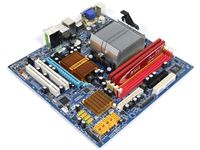Athlon Vs. Atom: Duel Of The Energy Savers
Conclusion: Athlon 64 Is More Economical, Faster, And Quieter
In our Munich lab’s duel of the energy-savers, the AMD Athlon 64 2000+ beats the Intel Atom 230 in energy consumption and processing power. Each of the systems was based on a desktop platform. The Achilles heel of the Intel system is its old system platform with the 945GC chipset, while AMD offers a more modern 780G platform.
The energy-saving solution from AMD offers more possibilities: it has three times as many SATA ports, possesses better onboard graphics performance, and can also support two monitors. Unlike the Intel solution, an HD resolution (1920x1200) with high picture quality is possible through DVI/HDMI ports. And early information suggests that the AMD Athlon 64 2000+ should cost close to $90.
In terms of noise level, AMD can again beat the Intel solution: in our test the AMD energy-saving platform was able to run without a fan. Due to the high energy consumption of Intel’s chipset, the Atom board requires active cooling for stable and error-free operation.
Although the Athlon 64 2000+ uses more power than Intel’s Atom 230 CPU, the entire system requires less energy both when idle and during full load operation because of the chipset. AMD currently offers the most energy-saving desktop platform on the market, and requirements could be lowered even further if the manufacturer of a 780G board decided to use a single-phase controller with other energy-saving components.
The AMD platform has one disadvantage, however: at present, the 780G chip set is only available on a microATX board, where Intel offers a significantly smaller miniITX board. It would be sensible if AMD also offered very small embedded boards, which would enable the company to widen the gap even further.
Get Tom's Hardware's best news and in-depth reviews, straight to your inbox.
Current page: Conclusion: Athlon 64 Is More Economical, Faster, And Quieter
Prev Page SiSoft Sandra-
wh3resmycar oh please, spare me those kind of crap...Reply
clearly the 780g platforms owns any nvidia/intel chipset to date.
about the article:
this is a winner, i mean this is like the ultimate HTPC setup you can ever have.no heat/power worries just plain movie enjoyment :D -
photoguru wow... good choices for matching mobos... why even take the time to write these articles? If you're comparing HTPCs that are low cost, efficient, and fast enough for encoding and decoding then do it with the right gear. Don't tell me that an ultra mobile processor just got pwned by a desktop chip unless they figured out how to make that desktop chip fit in an ultra mobile form factor.Reply
It doesn't make sense to compare them on those terms unless your entire argument is based on wattage and not actual form factor performance.
I will say that it would be interesting to find out what combination of low cost parts makes the most reasonable HTPC as far as performance/cost goes (with watts and temps included in case we could passively cool these babies). -
guusdekler Tom's choice of AMD hardware is a bit shortsighted in my opinion.Reply
There exist a lot more options that the matx board of his choice.
Let me name some of the MINI-ITX boards there are for AMD AM2 AM2+:
- Albatron KI690-AM2
- AOpen NMCP68ST-LA
- JetWay NC62K-LF
- MSI Fuzzy 690T
Allricht they employ a different chipset than the 780G but still very competetive as i derive this information from a dutch hardware magazine that tested these boards against intel's solution and especially the AOpen and MSI boards beat the crap out of intel's D201GLY2 board. -
apache_lives see this is what AMD is all about!!!!!!!!!!!Reply
Intel - produces first generation, limited, expensive and unflexible setups, AMD creates a cheaper flexible option for the masses, which kicks Intel back in line.
This opens the low power platform up to all new ideas, and allows vista to run properly thanks to the video performance etc, and ram support.
Nice one AMD! -
Wow! great, I hope next time, in 45 nm AMD will bring 2 phenom in one socket and become the new Phenom X8(like Intel pentium D) its just kick the new Intel Core i7. He, he, he...Reply
-
venteras I agree with photoguru, this is a pointless comparison. If you don't use the same form factor, i.e. mini-itx for both of them then what's the point? Unless if you want to disregard size and only compare performance/watt. However, since the whole point of the ATOM is to go 'smaller'... yeah, whatever.Reply
-
nottheking I must say I'm a bit surprised at the results. It's good to see that perhaps there's more life (and use) left in Athlon64s than we'd previously thought, if they make ideal low-power CPUs. Likewise, it's a surprise to find a place where AMD trumps Intel in the performance-per-watt sector, which is always important; I can perhaps imagining chips like the 2000+ and Atom being used for low-maintenance servers and datacenters, where PPW has always outweighed raw performance, since it's infinitely easier to buy more chips than to upgrade the local power grid.Reply
Now, if only Intel would develop an Atom-specific chipset that didn't consume copious amounts of memory. If AMD can get low-end GPU power sufficient for high-def decoding (regardless of what the CPU is) in under a single watt, certainly Intel could make a chipset that can handle all that is done by the 945GC and its laughable GMA 950 in even less power, since we're talking a less-complex design that has considerably less graphics power on hand, as well as the fact that Intel has access to 45nm production right now, while AMD is still stuck with 55nm. If only the chipset for an Atom didn't have several times the thermal envelope of the CPU...
